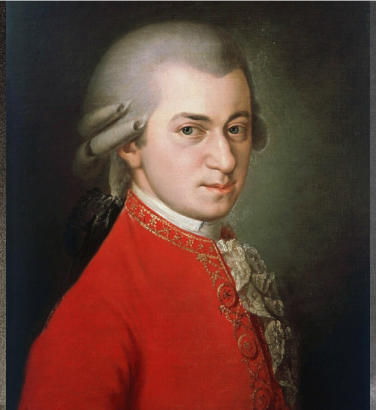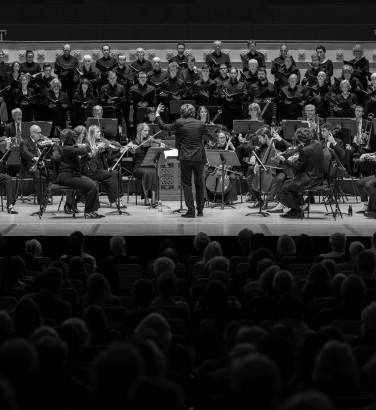
Why is there so little classical Christmas music?
28 Oct 2024
News Story
From left to right: Mozart, Bach and Corelli ... in slightly unfamiliar guise
The Christmas season is fast approaching, and festive concerts will soon be proliferating across the country: plenty of choral concerts, of course (including our own SCO Chorus at Greyfriars, 18-19 December), a smattering of organ recitals, some with a celebratory trumpet … but where do orchestras fit in?
There is, truth be told, something of a dearth of orchestral Christmas music. Add a chorus and the choice widens: Bach’s Christmas Oratorio (performed by the SCO on 28-29 November, in the lead-up to Advent) and Berlioz’ Childhood of Christ are almost pre-requisites, and for more modern tastes, there's Adams’ El Niño and MacMillan’s own Christmas Oratorio. Early music enthusiasts, in the meantime, will gravitate towards Charpentier’s Messe de minuit pour Noël, a 1694 setting of the Catholic mass based on old French Christmas carols.
From a more secular perspective (albeit needing only a children’s choir), Tchaikovsky’s Nutcracker is a clear favourite. Then there’s Handel’s Messiah, which has become such a mainstay of the season that it has almost transcended its religious roots. This is no mean feat considering the text’s focus on mankind’s salvation through the resurrection of Christ, especially as this actually makes it more suitable for Easter – an early section depicting the angels announcing his birth to the shepherds notwithstanding.
Take away the voices, however, and there’s not a great deal to choose from. Italian composers of the Baroque period (including Manfredini and Locatelli, but most famously Corelli) embraced the Pastorale as a closing movement for orchestral works generally known as Christmas Concertos, the most substantial of which may last a quarter of an hour or so.
Victor Hely-Hutchinson’s 1927 Carol Symphony is slightly more substantial, but suffers from being generally considered light music, a slightly derogatory term suggestive of guilty pleasures – a view compounded by the composer’s oeuvre also including the best-known setting of Edward Lear’s The Owl and the Pussycat. The Carol Symphony has also been associated with Masefield’s children’s novel The Box of Delights ever since the latter was first adapted for radio in 1943. The arrangement of The First Nowell heard in the third movement has become this story’s de facto theme tune: it was still being used in the 2021 version starring Sir Derek Jacobi. As enjoyable as the Carol Symphony may be, its long-standing connection with a work of children’s literature has very likely robbed it of any chance it may once have had of being taken as a piece of serious music.
As far as the great composers go, however, they have left us with next to no purely orchestral music specific to the festive season. The closest any of them got was Mozart, who included five sleigh bells in the scoring for the third of his German Dances, K 605. This more than lives up to its nickname of Sleigh Ride, but it’s such a slight piece (coming in at barely 3 minutes’ duration) that the music is perhaps better suited to encore territory.
As for the reason behind this relative lack of Christmas-themed music, it seems to be largely because historically, the high point of the Christian church year was always Easter, Christ's resurrection being far more significant than his birth. It was only in the mid-19th century that a more secular tradition of celebrating the season really took off. In Britain, Dickens’ 1843 novella A Christmas Carol revived an interest in festive customs which had fallen out of favour. Bolstered by the Victorians’ adoption of Christmas traditions (many of them imported by Prince Albert), this cemented 25 December as a key festival of the year.
Musically, there has been a steady stream of carol arrangements since, some with music dating all the way back to the medieval era (In dulci jubilo being among the oldest, hailing from 14th-century Germany), not that this really makes up for a substantial historical gap in the Christmas repertoire. Thankfully there is so much to choose from elsewhere that the absence of any festive music by Haydn, for instance (a composer you can be sure would have captured the joy of the season) does not seem too jarring.
Related Stories
![Three men, the first two in 18th century formal dress (one in black and white, one in a red coat), the last in an old photo, smoking]()
What is a sinfonia concertante?
17 March 2025
We delve into the history of a hybrid genre ...![]()
The SCO Chorus on music for Lent
10 March 2025
With Easter just around the corner, we delve into perhaps the richest (and often darkest) choral repertoire of all ...![]()
The bassoon concerto
3 March 2025
For the last article in our concerto series (for now), we turn to an instrument too often dismissed as the orchestra's resident joker.


